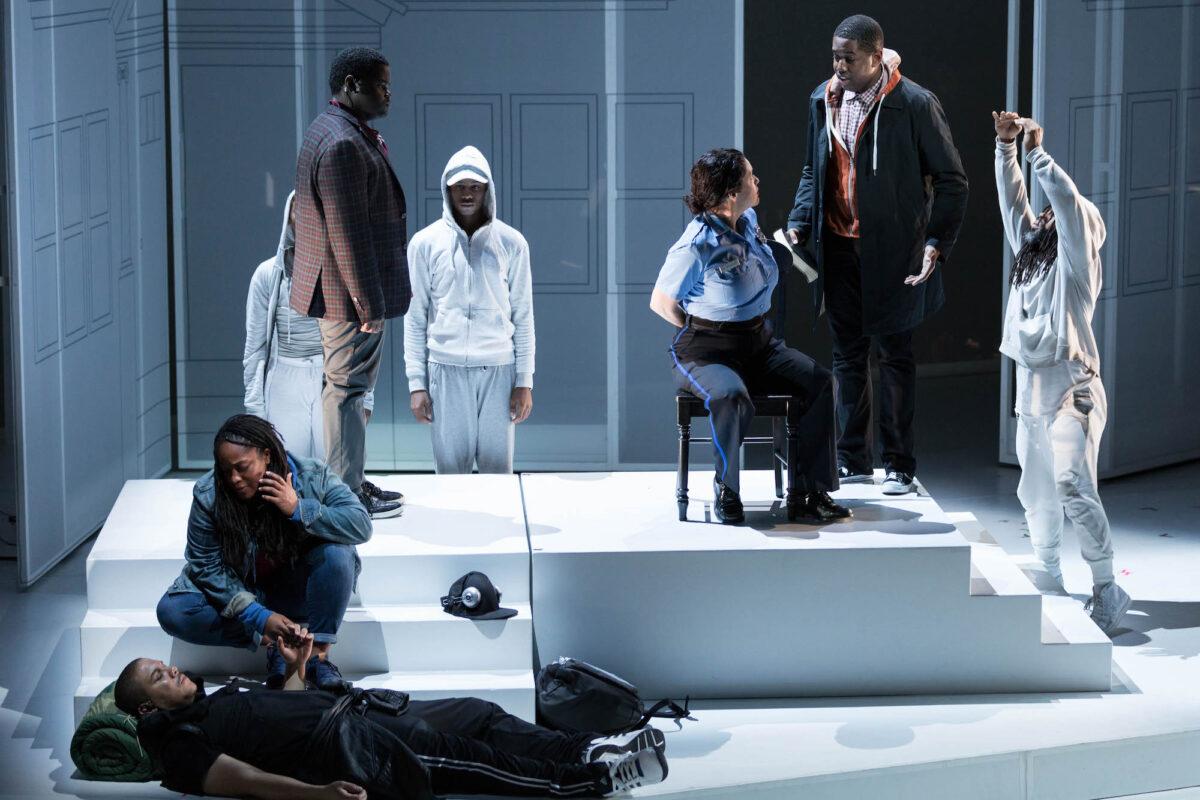
Opera about MOVE bombing, aftermath to be broadcast online Wednesday night
On May 13th, 1985 the Philadelphia Police dropped a bomb on the MOVE house in West Philadelphia, killing 11 people, including five children, and destroying an entire city block. Thirty five years later, as part of the demonstrations against police brutality that have engulfed this country over the past month, more than a thousand protesters gathered near where that house once stood at 62nd and Osage to listen to the survivors and their supporters.
On Wednesday evening Opera Philadelphia and the Esperanza Arts Center – the Hunting Park-based “center for Latino arts and culture in the Philadelphia region” – are co-hosting a special online presentation of “We Shall Not Be Moved,” a 2017 opera about the bombing and its aftermath. The production, which was filmed at the Wilma Theater in September of that year, was composed by Daniel Bernard Roumain, written by Marc Bamuthi Joseph, and directed by Bill T. Jones. A full list of cast and crew can be found on the Opera Philly website.
The plot of the opera is as follows: “On the run after a series of tragic incidents, five North Philly teens find refuge in an abandoned, condemned house in West Philadelphia at the exact location that served as headquarters of the MOVE organization.” Within that derelict building they discover not just the tragic history contained in the space but also just how much pain and suffering continues to reverberate throughout the neighborhood and the city as a result of what happened in 1985.
While “We Shall Not Be Moved” is part of Opera Philadelphia’s Digital Festival O – a push during quarantine to move the season online – Wednesday’s webcast was conceived by Esperanza Arts Center as a response to current events. Esperanza Senior Vice President Bill Rhoads told The Key that, “The story is indeed incredibly timely and relevant to the protests in Philadelphia and across the world. It goes without saying that while the most recent protests were sparked by horrific examples of police brutality toward George Floyd, Breonna Taylor, Maurice Gordon, Rayshard Brooks, and countless others, the history of this country is stained by over 400 years of violence and racial injustice. This includes the MOVE bombing in Philadelphia.”
Initially the opera was developed in part at the Hip H’opera after-school program, which is a collaborative initiative from Opera Philadelphia and Art Sanctuary. Esperanza Academy students, under the direction of Chief of Performing Arts in the Community Tania Ramos Oton, “participated in workshops with the Opera Philadelphia creative team throughout a span of approximately four years, developing an educational program that laid the foundation for the opera,” according to Rhoads.
“During this gestation period,” he explained, “Esperanza students also shared their stories of family, struggle, neighborhood, and future dreams.” In addition to that, he said that the dance ensemble at Esperanza produced and performed “several choreographed works that incorporated themes from the opera.” The academy is a charter school that’s part of what their website calls a “multi-service education and community economic development organization operating culturally sensitive programs to address the unmet needs of North Philadelphia’s community.”

The production is described by Opera Philadelphia as, “Combining spoken word, contemporary movement, video projection, classical, R&B and jazz singing, and a brooding, often joyful score filled with place, purpose, and possibility.” In a 2017 NPR interview, composer Roumain said he was inspired by everything from Bach and Gladys Knight to Eminem and Little Richard while writing the music.
Although opera might not be thought of as political, at least not these days, there is a longstanding tradition within the genre of it being used to both spotlight causes and also agitate for them. Rhoads explained that, “As a nexus of theater and music, the medium of opera is and has historically been one of the most potent forms of artistic expression in Western European tradition. Opera Philadelphia has shown through a broad spectrum of stunning productions that with the right story and creative team opera can not only be relevant but also – by virtue of its key elements – highlight important subtext and the depth and complexity of its characters in a manner few other mediums can.”
That ability of opera to engage with topics as complex as the MOVE bombing and institutional racism is what makes this production feel so necessary. As Rhoads put it: “’We Shall Not Be Moved’ gives all of us a chance to listen to and feel more deeply for those whose lives were (and continue to be) shattered, cut short, and tormented by prejudice and racial inequity.”
“We Shall Not Be Moved” will be streamed from the Esperanza Arts Facebook page Wednesday evening. It can also be watched via Opera Philadelphia.